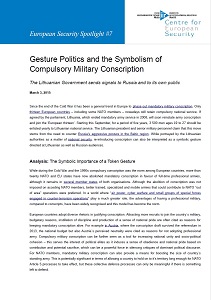Gesture Politics and the Symbolism of Compulsory Military Conscription - The Lithuanian Government sends signals to Russia and to its own public
Gesture Politics and the Symbolism of Compulsory Military Conscription - The Lithuanian Government sends signals to Russia and to its own public
Author(s): Markéta Wittichová
Subject(s): Politics, International relations/trade, Security and defense, Military policy, Peace and Conflict Studies
Published by: Ústav mezinárodních vztahů
Keywords: gesture politics; compulsory military conscription; Lithuania; government; Russia;
Summary/Abstract: Since the end of the Cold War it has been a general trend in Europe to phase out mandatory military conscription. Only thirteen European countries – including some NATO members – nowadays still retain compulsory national service. If agreed by the parliament, Lithuania, which ended mandatory army service in 2008, will soon reinstate army conscription and join the ‘European thirteen’. Starting this September, for a period of five years, 3 500 men ages 19 to 27 should be enlisted yearly to Lithuanian national service. The Lithuanian president and senior military personnel claim that this move stems from the need to counter Russia's aggressive posture in the Baltic region. While portrayed by the Lithuanian authorities as a matter of national security, re-introducing conscription can also be interpreted as a symbolic gesture directed at Lithuanian as well as Russian audiences.
Series: European Security Spotlight
- Page Count: 2
- Publication Year: 2015
- Language: English
- Content File-PDF

